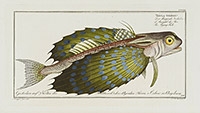Start project A New History of Fishes
The NWO just announced the results of the Vrije Competitie proposals. Paul Smith, professor at the French department is, as a member of LUCAS, one of three scholars within the Faculty of Humanities at Leiden University who has been awarded this grant.

His project A New History of Fishes. A long-term approach to fishes in science and culture, 1550-1880, provides employment until 2019 for three PhD students, two postdocs and a research assistant: a special project in which researchers from various disciplines and institutions cooperate.
Ichthyology: the study of fish
Smith outlines the context: “From 1550 onwards, a great interest in the natural world developed across Europe. This interest was not only stimulated by a growing knowledge of local flora and fauna, but also by the import of numerous exotic animal and plant species. Think, for instance, of researches and collectors like Gessner and Clusius, and later Rumphius, Seba and Siebold. Ichthyology plays a leading role in this. From 1550, we see that Europe is flooded with thick books on fishes, in different languages and with beautiful illustrations. Ichthyology holds this avant-garde position until well into the nineteenth century."

Besides, the interest in fish was not purely scientific. Paul Smith continues: “Fisheries and the fish trade were pillars of the economy. Fish was important in the kitchen as well as in medicine. There were unusual fish to be seen in cabinets of curiosities. Information about fish was provided by, generally wealthy, amateur scientists, virtuosi, or by people who worked in fisheries and the fish trade. From about 1600, fish were increasingly being portrayed in art, leading to the emergence of specialized genres such as fish still lifes and print series featuring images of fish."
Interdisciplinary
The role of ichthyology in science, art and culture has always been underexposed. This is a gap that Paul Smith and his colleagues will fill. In collaboration with researchers from Naturalis Biodiversity Center in Leiden, this project will examine what the place of ichthyology was in the science and culture of Europe from around 1550 to 1880. The theoretical framework is the New History of Science, which considers the development of science in a broad cultural and historical framework, including attention to social (patronage, institution), (national-)political, religious and artistic aspects.

For this, Paul Smith has assembled an interdisciplinary research collaboration consisting of two postdocs Florike Egmond and Marrigje Rikken and Karl Enenkel (Neolatinist, University of Münster), Eric Jorink (Huygens Institute, The Hague), Menno Schilthuizen (biodiversity, Naturalis) and Martien van Oijen (marine biology, Naturalis), who act as co-supervisor of the PhD students who will complete their doctoral research within this project. The research of the PhD students and postdocs is complementary. The PhD students will analyze the important fish books, especially focusing on four aspects that continued to play a key part in ichthyology throughout the period namely: autopsy, classification, illustration, and description, while both postdocs will delve into the cultural context of ichthyology.
The total budget of the project is almost one million euros, as Naturalis and LUCAS will provide financial support to supplement the NWO grant.
NWO announcement (in Dutch)
